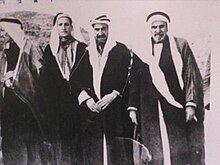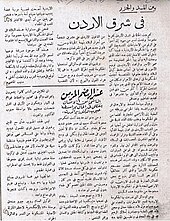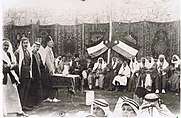Rashed Al-Khuzai
Prince Rashed Al Khuzai | |
|---|---|
 | |
| Prince of Ajloun | |
| Reign | 1850–1957 |
| Born | 1850 Kufranjeh, Jordan |
| Died | 1957 Kufranjeh, Jordan |
| Noble family | Al Khuzai |
| Father | Prince Khuzai bin Durgham |
Prince Rashed Al-Khuzai (Arabic: الأمير راشد الخزاعي), full name Prince Rashed bin Prince Khuzai bin Durgham bin Fayad bin Prince Mustapha bin Salameh Al Fraihat (1850–1957),[1] was a Sunni Islamic political figure. In 1937, he began the Revolution of Ajloun by forming the Arab anti-colonial militant group Rebels of Ajloun. Until his death in 1957, he was associated with Sheikh Izz ad-Din al-Qassam.[2][3][4][5][6][7]
History of Ajloun[edit]

Before the victory of the Turkish Empire (Ottomans) over the Mamluks in the battle of Marj Dabek, Ajloun Mountain (Jabal Ajloun in Arabic) was a base for emirates which controlled Jordan and portions of Palestine. The strength of the principality and its rulers led the Ottomans to name Ajloun the Emirates of Ajloun (a sanjak) in 1517.
The town of Kufranjah is the seat of tribal and emirate governance through the al-Fraihat family, who ruled the region for hundreds of years and protected pilgrims to the Levant.[4][8][9][10] The Ajloun region and Prince Rashed Al-Khuzai are known to the Palestine Liberation Organization leadership. The city of Ajloun, in Jordan's Hashemite Kingdom, has supplied liberation movements. Its government, formed at the 1920 foundation of the Emirate of East Jordan, struggled against colonialism.[4][9][11][12][13][14][15][16][17]

Before 1920, the emirate of Ajloun was governed by the Ottoman sultan Prince Rashid bin Khuzai Alfraihat, ruler of the southern Levant (Jordan and portions of Palestine). Before the 1920 formation of the Ajloun Governorate, Rashid appointed Ali Niazi Al-Tal as governor and Abdullah Rehani chief of security and police; al-Khuzai represented the Ottoman sultan as prince. At the beginning of Ottoman rule in the sandjak in 1517, Ajloun included the Houran plains, present-day Jordan and the city of Nablus.[8][11] Al-Khuzai was known as the Prince of Ajloun Mountain, Father of Ajloun, Father of the (1937) Ajloun revolution, and Godfather of Ajloun.[8]
Jordanian prince[edit]

Al-Khuzai was born in Kufranjeh in 1850, the son of Prince Khuzai bin Durgham bin Fayyad bin Prince Mustafa bin Salameh Al-Fraihat. His ancestors had ruled the region for generations, and he made the Mountain of Ajloun its capital. The region included the Houran plains, Dur’aa, Irbid, Jerash, Ajloun, and the city of Nablus.[4][5][8][9]
He ruled the southern Levant before King Abdullah I, who established Transjordan with the support of the British Mandate and its allies. Al-Khuzai's family had focused on leading the Ajloun clan through literacy and religious education. He received his education in the home of his father, Prince Khuzai, which was an administrative gathering place. Prince Khuzai, who commanded an army of thousands, allied with the al-Adawn tribe; Al-Fraihat Castle was held by that tribe until 1922, when it was taken by the Jordanian leadership of Crown Prince Abdullah I and renamed Alrabad and (later) Ajloun Castle.[4][5][8][9] Al-Khuzai was the only Jordanian who supported Omar Mukhtar's revolution against Italian colonialism in Libya, financially, with ammunition and weapons, and by supplying manpower.[4][5][8]
Religious unity[edit]

When sectarian strife erupted in Lebanon and Syria near the end of the Ottoman Empire, al-Khuzai accepted Christians refugees and protected Christians in eastern Jordan. He said that any assault or abuse directed at a Christian would be considered an attack on him, his tribe and all tribes under his rule, and would be punished.[8][18][19][20][21][22][23][24][25][26][27][28] Al-Khuzai received a gift from the pope in 1887, the first Arab leader to do so. He and Muhammad Ali of Egypt were the only two leaders given the title of pasha by the Ottoman sultan.[26][27][29][30]
Palestine and exile[edit]

Before the formation of the Emirate of East Jordan and the emergence of local governments (such as the government of Ajloun) in 1920, al-Khuzai ruled the plains of Houran, Irbid, Ajloun, Jarash, and the city of Nablus. He supported Palestinian revolutions in 1935 and 1936,[32] protecting and supplying the rebels and meeting with other Palestinian leaders.[4][5][8][11]
Supporters of al-Khuzai confronted the Jordanian regime led by King Abdullah I and the British Mandate, who bombed his positions and killed many of his supporters. In 1937, al-Khuzai and a group of fellow Jordanian leaders of Jordan in 1937 left Jordan for Saudi Arabia. After nearly eight years as a guest of King Ibn Saud, they were welcomed back by the Jordanian tribes and Arab rebels and nationalists.

[4][5][8][11][12][13][9][33] During al-Khuzai's exile, supporters blew up a Jordanian oil pipeline from Iraq.[4][5][8][9][11][12][13] A number of Palestinian guerrillas in the 1982 war in Lebanon had pictures of al-Khuzai in their pockets with their ammunition.[22][23][24][25][26][27]
Nationalism[edit]
Al-Khuzai suggested a Jordanian national conference, which he led in 1928. It opposed giving Palestine to the Jews and resisted what it saw as traitors in eastern Jordan and Arab leaders who wanted to broker Palestine.[8][34]
He supported Arab liberation movements such as the Syrian revolution, and supported Kufranjeh when hundreds of activists fled there from Syria on July 25, 1920. Al-Khuzai made his birthplace a major location for members of the Independence Party, while Syrian revolutionary leaders used his home as a communications base.[4][5][8] He transformed Kufranjeh and Ajloun into bases of struggle against colonialism and joined the Arab nationalists. Al-Khuzai led a number of demonstrations, including one in Irbid which protested the June 17, 1930 execution of Palestinian activists Fuad Hijazi, Atta Al-Zeer, and Mohammad Khaleel Jamjoum by the British. After the Buraq revolution which began in Jerusalem on August 9, 1929, he had a prominent role in the Islamic conference held in that city. Al-Khuzai's main goals were Arab unity and freedom from colonialism, exemplified by his participation in the Bloudan Conference of 1937.[4][5][8] Al-Khuzai's revolution reflected Jordanian needs for freedom, democracy, and unity with the Palestinian people,[35] and much information about him was hidden by the Jordanian regime.[8][4][5]
Death and legacy[edit]
He died in Kufranjeh in 1957,[4][5][6][24] and poems have commemorated him.[36][37]
References[edit]
- ^ The Kingdom Channel was broadcast a special biography of Rashed Al-Khuzai and his role in establishing the Jordanian state. This channel is the national channel of kingdom ofJordan, and the biography title is: On the Road of Founders. Biography was broadcast on January 13th 2019. https://www.almamlakatv.com/videos/singleepisode/11001.
- ^ "Sheikh Rashed Al-Khuzai...A patriot and an Arabian Leader...The first part=April 21st 2022". Enjaz Jordanian News Agency, an article published by the Jordanian historian and author Mr. Awad Al Malahmeh.
- ^ "Sheikh Rashed Al-Khuzai...A patriot and an Arabian Leader...The third and final part=April 21st 2022". Khaberni Jordanian News and Media Agency, an article published by the Jordanian historian and author Mr. Awad Al Malahmeh.
- ^ a b c d e f g h i j k l m "Rashed Al Khuzai .. Home of the men and militants in the nation". Alrai Official Jordanian News Paper, an article published by the Jordanian historian and author Mr. Haza'a AlBarari. 27 July 2009.
- ^ a b c d e f g h i j k "Rashed Al Khuzai .. Home of the men and militants in the nation, an article published by the Jordanian Historian & Writer Mr. Haza'a AlBarari". Saheel News, Amman-Jordan. 27 July 2009.
- ^ a b "The political relationship between Prince Rashed Al Khuzai and Sheikh Izz ad Din al Qassam". The Arab Orient Center for Strategic and civilization studies London, United Kingdom. 21 November 2010.
- ^ "Honorable History of Prince Rashed Al-Khuzai, an article published by the Swedish Historian and Writer Dr. Mohammad Rahhal". Palestinian Official Website. 10 October 2010. Archived from the original on 16 March 2012. Retrieved 31 December 2010.
- ^ a b c d e f g h i j k l m n "History of Prince Rashed Al Khuzai, an article that was published by the American Writer Mr. Muneer Husainy and the Saudi Historian Khalid Al Sudairy". The Egyptian Magazine "Noon", Cairo- Egypt. 27 November 2009. Archived from the original on 11 September 2011. Retrieved 31 December 2010.
- ^ a b c d e f "The historical strong ties between King Abdul-Aziz Al Saud, founder of the Kingdom and Prince Rashed Al-Khuzai, ruler of Ajloun Emirate, this article was edited and published by the Saudi Historian Mr. Khalid Al Sudairy". Saudi Official Site "Historian Net"-from the Archive home of King Abd al Aziz Al Saud. 1 December 2009. Archived from the original on 7 July 2011.
- ^ "The political History for government of Ajloun". Dr. Adel Azzam, a Jordanian Dr. Adel Azzam, a Jordanian Legal Author and Thinker. 10 April 2011.[permanent dead link]
- ^ a b c d e "Sheikh Izz ad Din al Qassam and Prince Rashed Al Khuzai role in the Palestinian revolution at 1935". Althawra News-The Official Website of the Palestinian National Authority (Fath Movement). 23 February 2010. Archived from the original on 5 March 2016. Retrieved 29 January 2012.
- ^ a b c "Historical & political stands of Prince Rashed Al Khuzai with the Revolution of Sheikh Izz ad-Din al-Qassam in Palestine at 1935". Arab News Network, London, United Kingdom. 2008-01-13.
- ^ a b c "History of Sheikh Izz ad-Din al-Qassam and Prince Rashed Al-Khuzai". Dr. Adel Azzam, a Jordanian Legal Author and Thinker. 20 November 2010. Archived from the original on 8 December 2010. Retrieved 11 January 2011.
- ^ "Government of Ajloun". Jordan Zad news website, a special article published by the Jordanian historian and writer Mr. Jehad Alzgool. 30 April 2011.
- ^ "Prince Rashed Al-Khuzai leadership and revolution". Petra News website, a special article published by the editor in chief of Petra News. 2011-10-27.
- ^ "Prince Rashed Al-Khuzai". Editor in chief of Ajloun Castle News. 2012-01-06. Retrieved 2012-01-29.[dead link]
- ^ "Prince Rashed Al-Khuzai". Head of the Jordan National Movement, historian, and author Dr. Ahmad Oweidi Al-‘Abbadi. 16 July 2015. Archived from the original on 26 January 2016. Retrieved 31 January 2016.
- ^ "The historical role of Prince Rashed Al Khuzai in protecting Christianity and refugees from Christian people from all the Levant region, and as a result to his pivotal stands Prince Rashed Al Khuzai had awarded the scarf sacred tomb from the Bishop of Rome and this was happened at 1887". Alamalyawm- International political news paper launched from Kuwait. 24 November 2009. Archived from the original on 7 July 2011.
- ^ "This article proves the historical role of Prince Rashed Al Khuzai in protecting refugees of Christian people from all the Levant region, and as a result to his noble stands Prince Rashed Al Khuzai had awarded the scarf sacred tomb from the Bishop of Rome and this was happened at 1887". Albayan News-U.A.E International News Paper. 17 October 2009.
- ^ "Honorable History of Prince Rashed Al-Khuzai, an article published by the Swedish Historian Dr. Mohammad Rahhal". Odaba Sham Network, London- United Kingdom. 16 October 2010. Archived from the original on 26 April 2015. Retrieved 31 December 2010.
- ^ "Honorable History of Prince Rashed Al-Khuzai, an article published by the Swedish Historian Dr. Mohammad Rahhal". Al Arab News. 2010-09-10. Archived from the original on 2011-07-07. Retrieved 2010-12-31.
- ^ a b "Honorable History of Prince Rashed Al-Khuzai, an article published by the Swedish Historian Dr. Mohammad Rahhal". Jazeerat Alarab News. 7 December 2010.
- ^ a b "Honorable History of Prince Rashed Al-Khuzai, an article published by the Swedish Historian Dr. Mohammad Rahhal". Organization of Iraqi Writers for Freedom (IWFFO). 2010-10-08.
- ^ a b c "Honorable History of Prince Rashed Al-Khuzai, an article published by the Swedish Historian Dr. Mohammad Rahhal". The Libyan National Movement. 2010-10-09. Archived from the original on 2014-07-20. Retrieved 2011-01-11.
- ^ a b "Honorable History of Prince Rashed Al-Khuzai, an article published by the Swedish Historian Dr. Mohammad Rahhal". Neinawa News. 2010-10-12. Archived from the original on 2011-07-14. Retrieved 2011-01-11.
- ^ a b c "Honorable History of Prince Rashed Al-Khuzai, an article published by the Swedish Historian Dr. Mohammad Rahhal". Altwafoq News. 2010-10-09. Archived from the original on 2016-03-08. Retrieved 2011-01-11.
- ^ a b c "Honorable History of Prince Rashed Al-Khuzai, an article published by the Swedish Historian Dr. Mohammad Rahhal". Felix News, Yemen. 2010-10-09.
- ^ "Flow of secrets came from the grave of Prince Abd al-Qadir al-Jaza'iri". Editor in chief of Es Salam El Youm, an official Algerian daily news paper. 2011-10-29. Archived from the original on 2017-10-14. Retrieved 2012-01-29.
- ^ "Head of the mass media". The Jordanian historian and author Mr. Mahmood Zyoudi. 2011-02-13.[permanent dead link]
- ^ "President and Christianity". The Jordanian historian and author Mr. Mahmood Zyoudi. 2011-01-11. Archived from the original on 2011-09-08. Retrieved 2012-01-29.
- ^ the archives of the Palestine Liberation Organization, a documentation of the role of Prince Rashed Al-Khuzai in the revolution of Sheikh Izz al-Din al-Qassam "The 81st Anniversary of the Martyrdom of the Venerable Sheikh Izz al-Din al-Qassam=November 20 2016" (Press release).
{{cite press release}}: Check|url=value (help) - ^ "Hey Jordanians don't bore the Palestinian your sins". Niroon News website, a special article published by the Palestinian historian and writer Mr. Mohammad Alwaleedi. 2011-09-16.
- ^ "Confession with Admire to the King". Blog of the Saudi Historian Mr. Hasan Al Odail. 2010-04-29.
- ^ "The Jordanian National Conference that was led by the late Prince Rashed Al Khuzai to support the legitimate rights of Palestinian people on the land of Palestine, and to resist colonialism". Mr. Hazza’a Al Tal, historian and writer from Jordan. 2010-05-06.
- ^ "Jordanians between Hashemite Kings and sissy birds". Mr. Nasr Al Majali, an editor in chief of Aaram Media Solutions at London, UK. A dedicated Arab journalist and political analyst. 2011-10-11.
- ^ "Poetry in Arabic "Jewel of Arabism" (Jewel of Arabism, 18/01/2011, by Poet Mr. Yazeed Alrashed Al-Khuzai- This poetry were written and gifted on the anniversary of Prince Rashed Al-Khuzai death)". Arabian Awareness, Canada. 2011-01-18.
- ^ "Prose Poems in Arabic "al-Robaeyat Al Rashidiya" (Rashidiya Quartets, 2009, by Poet Mr. Mahmmoud Abdu Fraihat- These poems were gifted on the anniversary of Prince Rashed Al-Khuzai death)". Alrai Official Jordanian News Paper. 2009-02-17. Archived from the original on 2011-07-07. Retrieved 2011-01-11.
Further reading[edit]
- Arab East Center, London; the relationship between al-Khuzai and Izz ad-Din al-Qassam (in Arabic)
- Arab News Network, London; political relationship between al-Khuzai, Izz ad-Din al-Qassam, and Saudi Arabia (in Arabic)
- Al Arab News article by Mohammad Rahhal Archived 2011-07-07 at the Wayback Machine (in Arabic)
- Suleiman Musa, Emirate of East Jordan: Origins and Evolution in a Quarter-Century. Amman: Commission of Jordanian History, first edition (1990).


